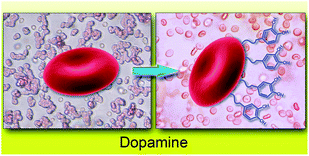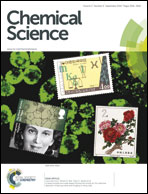Antigenically shielded universal red blood cells by polydopamine-based cell surface engineering†
Abstract
Blood type mismatching is a critical problem in blood transfusions and it occasionally leads to severe transfusion reactions and even patient death. Inspired by the adhesive proteins secreted by mussels, we suggest a catecholic chemistry-based strategy to shelter antigenic epitopes on red blood cells (RBCs) by using polydopamine (PDA), which can guard against coagulation reaction without other negative effects on the RBC structure, function and viability. Both in vitro and in vivo studies confirm that the PDA-engineered RBCs (PDA-RBCs) can be applied in blood transfusion practices. The systemic assessment using a murine model demonstrates that the modified RBCs have a perfect survival profile even with repeated transfusion and high transfusion rates up to around 60%. It follows that an appropriate biogenic-chemical modification can produce antigenically shielded universal RBCs and provide insight for cell transplantation by using cell surface engineering.


 Please wait while we load your content...
Please wait while we load your content...